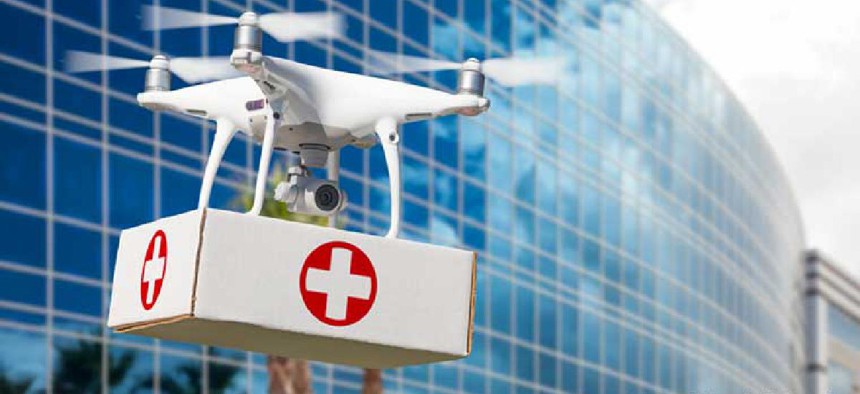Making drone deliveries a reality


Connecting state and local government leaders
North Carolina's pilot program will use drones to fly medical supplies between hospitals.
The North Carolina Department of Transportation has been using drones since 2016 in a variety of functions, including photogrammetry and general imaging. The agency has grown its fleet to 15 drones and helped develop a statewide training program in community colleges. And as a winner of the U.S. Department of Transportation's Drone Integration Pilot Program, NCDOT is ready to expand its unmanned aerial systems program.
There are multiple drone applications NCDOT wants to test during the two-and-a-half-year pilot, but the application being prioritized is one that’s garnered significant attention: drone delivery of medical supplies.
“In the end we want package delivery that is beyond line of sight, that is also over people" and can happen during the day or at night, said Basil Yap, the UAS program manager for NCDOT. An added bonus would be the ability to have a single pilot oversee multiple drones, he said.
North Carolina will be working with two companies with experience in the drone delivery of medical supplies. Matternet has made medical deliveries in Switzerland, and Zipline, has done the same in Rwanda. Between the two, they have logged thousands of drone flight hours, Yap said.
In the Tar Heel state, the drones will deliver “high-value, time-sensitive medial packages” like blood, urine and pharmaceuticals, Yap said. The drones can carry up to five pounds, and Zipline is able to operate in a 50 to 60 mile radius.
The exact delivery process has yet to be determined, but a hospital’s existing medical logistical software will likely be integrated with software from Matternet or Zipline, Yap said.
Three research hospitals in the Research Triangle – WakeMed in Raleigh, UNC Medical Center in Chapel Hill and Duke University Hospital in Durham -- are part of the reason officials decided to prioritize medial delivery for the pilot. Exactly which hospitals will be part of the delivery network is another decision that still needs to be made. The state plans to pick “some strategic facilities to start with and build it out over time,” Yap said.
“What we’re doing right now is establishing those relationships with health care providers and understanding what their needs are,” Yap said. “Because what we don’t want to do is just a bunch of demo flights. We want to actually complete flights that are a benefit to our health care system.”
Medical supplies might not be the only thing taking flight in North Carolina. FlyTrex, an Israeli company, wants to make other deliveries, too. It wants to start by setting up shop in a strip mall and making food and package deliveries to nearby neighborhoods and expand from there. The company has tested food delivery via drone in Iceland, Yap said.
Just as with the other IPP projects, an important part of North Carolina's pilot program will be determining the locations of the drones in flight. Telemetry data can transmitted over cell networks, and NCDOT has partnered with TMobile as a cell provider for the project. But Yap and his collleagues also are looking at using automatic dependent surveillance -- broadcast technology during the pilot as a redundant system to track drones that fly beyond line of sight. Location awareness will be especially important around hospitals, Yap pointed out, because there are already helicopters regularly coming and going.
The next step for NCDOT and the nine other winners of the IPP is a two-day meeting in Washington, D.C., later in June with Federal Aviation Administration officials to lay the groundwork for the next two-and-a-half years.
NCDOT, meanwhile, plans to begin delivery operations in August.
“What those operations look like exactly is … to be determined,” Yap said.




